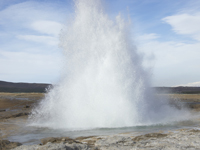Ever wonder where Iceland got its name?
 Ever wonder where Iceland got its name? Having just returned from this small volcanic crag amidst the wind-swept north Atlantic (just south of the Artic Circle), I don’t wonder any more! But did you know that this proud nation of glaciers, hot springs, geysers (a word we’ve borrowed from Icelandic), and active volcanoes is the world’s most literate population, with the world’s longest life expectancy and highest standard of living? And so you won’t be surprised that they are also the most “wired” (technologically savvy) nation on earth, as well. But their achievements have come at history’s high price. Literature (not archaeology) suggests that Irish monks were the first to settle the island in the eighth and ninth centuries, quickly followed by Norse sailors from Norway. A colony eventually dug its roots into that rocky outcropping that became a base for Viking settlements, including Eric the Red (who discovered Greenland) and his son Leif Eriksson (the first European to reach North America). The Althing, the world’s oldest existing national assembly or parliament, was formed in Iceland in 930 A.D. But colonizing foreign powers from Norway to England to marauding pirates to Denmark subsequently made Iceland’s history one of struggling difficulty. In fact it wasn’t until 1944 that Iceland’s ties to the Danish crown were finally broken, and its proud people achieved their national independence. The Lutheran Church is the official state church of Iceland, with 82.1% of the population (from the most recent census) indicating membership in that National Church of Iceland. The Icelandic reality, however, reflects western Europe’s postmodern secular culture with little interest in organized religion. And so this last weekend, after taking out a full-page ad in the Reykjavik newspaper, the Adventists of Iceland (around 500) rented a hotel conference room with the goal this time of reaching out to the churched public. And there I preached four lectures for both church and public. But the challenge remains for our western culture—how shall we engage the minds and hearts of our societies with the everlasting gospel? (Which, by the way, was the theme of an evangelism council for pastors across Europe that Russell Burrill and I lectured at this past Monday and Tuesday there on Iceland.) Today we celebrate Calvary’s promise of symbolically transforming earth’s “iceland” into heaven’s “greenland” one day, when "the kingdom of the world has become the kingdom of our Lord and of his Christ, and he will reign for ever and ever" (Revelation 11:15). And though that promise is yet future, its reality is truly present in the presence of Christ at His Table this morning. So may every heart take possession today of that freedom our Lord’s triumphant death has secured for all!
Ever wonder where Iceland got its name? Having just returned from this small volcanic crag amidst the wind-swept north Atlantic (just south of the Artic Circle), I don’t wonder any more! But did you know that this proud nation of glaciers, hot springs, geysers (a word we’ve borrowed from Icelandic), and active volcanoes is the world’s most literate population, with the world’s longest life expectancy and highest standard of living? And so you won’t be surprised that they are also the most “wired” (technologically savvy) nation on earth, as well. But their achievements have come at history’s high price. Literature (not archaeology) suggests that Irish monks were the first to settle the island in the eighth and ninth centuries, quickly followed by Norse sailors from Norway. A colony eventually dug its roots into that rocky outcropping that became a base for Viking settlements, including Eric the Red (who discovered Greenland) and his son Leif Eriksson (the first European to reach North America). The Althing, the world’s oldest existing national assembly or parliament, was formed in Iceland in 930 A.D. But colonizing foreign powers from Norway to England to marauding pirates to Denmark subsequently made Iceland’s history one of struggling difficulty. In fact it wasn’t until 1944 that Iceland’s ties to the Danish crown were finally broken, and its proud people achieved their national independence. The Lutheran Church is the official state church of Iceland, with 82.1% of the population (from the most recent census) indicating membership in that National Church of Iceland. The Icelandic reality, however, reflects western Europe’s postmodern secular culture with little interest in organized religion. And so this last weekend, after taking out a full-page ad in the Reykjavik newspaper, the Adventists of Iceland (around 500) rented a hotel conference room with the goal this time of reaching out to the churched public. And there I preached four lectures for both church and public. But the challenge remains for our western culture—how shall we engage the minds and hearts of our societies with the everlasting gospel? (Which, by the way, was the theme of an evangelism council for pastors across Europe that Russell Burrill and I lectured at this past Monday and Tuesday there on Iceland.) Today we celebrate Calvary’s promise of symbolically transforming earth’s “iceland” into heaven’s “greenland” one day, when "the kingdom of the world has become the kingdom of our Lord and of his Christ, and he will reign for ever and ever" (Revelation 11:15). And though that promise is yet future, its reality is truly present in the presence of Christ at His Table this morning. So may every heart take possession today of that freedom our Lord’s triumphant death has secured for all!